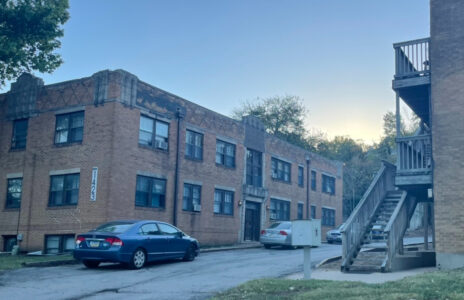Local leaders don’t want other communities to make Lawrence’s homeless problem worse, and they’re asking the state to act

photo by: Shawn Valverde/Journal-World
Tents at homeless camps are pictured in North Lawrence behind Johnny’s Tavern on Monday, March 11, 2024.
When a small community in Kansas has a homelessness problem, what’s stopping it from just dropping people off on the streets of a bigger city like Lawrence?
Last year, the deterrent might have been some “colorful language.”
According to Lawrence Police Chief Rich Lockhart, that’s what the Anderson County Sheriff’s Department got after it dropped a homeless woman off here. She was arrested after reports that she was naked in downtown, and Lockhart in August 2023 said Douglas County Sheriff Jay Armbrister sent an email to his Anderson County counterpart that basically said, “I want you to knock this off.”
Now, Lawrence city leaders want to make it clear that colorful language is not enough — and the state needs to act.
In its 2025 legislative priorities statement, which was approved by the City Commission this past week, the city of Lawrence is asking for specific action from the state level to prohibit this type of action by other local governments and organizations. It’s also seeking programs that will address shortages of affordable housing and alleviate financial pressures on low-income people, things that could help Kansas communities better care for their homeless populations on their own.
“The Legislature has an opportunity to be proactive in developing and funding solutions that support all local communities and Kansans across the state,” said Assistant City Manager Brandon McGuire.
And, whether that happens or not, McGuire hopes to send a message that Lawrence’s top priority in its homeless response is taking care of people who are from Lawrence.
• • •
That starts with one of the longest and most noticeable items on the statement — a sort of wish list that the city compiles at the end of each year and sends to lawmakers before the state legislative session begins in January. Standing out among the requests for environmental programs and economic development initiatives is a request for a specific new law about transporting homeless people across county lines.
The law the city is asking for would prohibit any organization that receives state funding — including local governments — from dropping homeless people from one county off in a different county, unless they have “received specific assurances” beforehand that there will be services available for the person in the place where they’re being dropped off.
It’s a law that McGuire has asked legislators for in person, too — and one that didn’t get much traction.
More than a year ago, in November 2023, McGuire spoke to the Legislature’s Special Committee on Homelessness and requested such a law. Lawmakers took the request under advisement, but some also made it clear that they thought Lawrence had itself to blame for much of its homeless problem.
Republican Sen. Beverly Gossage, for instance, said she’d heard that “some of the rules and regulations passed by the City Commission are part of the reason you have such an influx of people coming into the community.”
McGuire wanted to make it clear that it’s not just people from elsewhere deciding to come to Lawrence — it’s people being brought here, which city officials have seen happen firsthand.
That woman who was dropped off by Anderson County law enforcement, Chief Lockhart said in August 2023, was part of a trend that’s “happening pretty frequently.” He told the Journal-World then that Jefferson and Shawnee counties had also been bringing people who were homeless, mentally ill or both to Douglas County, often dropping them off in North Lawrence just off of the turnpike.
McGuire said via email that he is not aware of a recent influx of homeless people from other counties moving into Lawrence. But when people from other places do arrive, the city has developed new ways to handle it.
A specific set of steps has been laid out for when the city’s Homeless Outreach Team or other service providers meet a homeless person who recently arrived in Lawrence, McGuire said. The providers follow the steps and help the person relocate either to their city or town of origin or to some other place where they can receive resources.
The goal isn’t to shut out people from out of town, McGuire said, but to make sure that homeless individuals who are from Lawrence get priority.
“The intent of our policy is to ensure that our locally funded services are provided to our community members,” McGuire said.
• • •
Democratic State Sen. Marci Francisco is interested in the legislation that the city is requesting, in part because she thinks local governments should do more to support homeless people where they are.
Francisco said that sometimes, when homeless people are moved around, it might be with good intentions. For example, she said, someone’s friend might drop them off in a city like Lawrence because it does have more services. But she said law enforcement agencies should be discouraged from doing the same.
Law enforcement should instead take responsibility to help their neighbors in the community, she said, rather than just shifting the responsibility to a place with more resources and assuming people will be able to get help there.
“Resources can be stressed if you are moving people around rather than addressing the issue,” Francisco said.
But, in order for people to get support in their own communities, Francisco said the state needs to do its part.
The city’s legislative priorities statement agrees, and so does that of the League of Kansas Municipalities, which is attached to it. The League’s statement says that because homelessness is “putting strain on local budgets, law enforcement agencies and mental health professionals,” state government “should enhance local initiatives by providing resources, coordination and strategic guidance.”
Although homelessness is more severe in Lawrence than in other places, McGuire stressed that the number of homeless people has been on the rise across the state. In the point-in-time homeless count — a tally of how many people are sleeping outside on a single night in January of each year — McGuire said there were 2,815 Kansans counted in 2024, a 7% increase from the count the year before. The point-in-time count tends to be an undercount of the actual homeless population, so the real number is almost certainly higher.
And, in addition to those who are sleeping outside or in shelters, McGuire noted that “thousands” more Kansans could be at risk of experiencing homelessness due to financial and housing-related stresses.
Francisco said she wants every Kansas community to be able to address its own situation without adding to problems in other communities, and that will take a set of holistic solutions. She said the state has recently been working to address housing needs, but the focus has been on building housing units, not on helping people who suddenly face homelessness.
“We need to find a set of solutions to address this because nobody wants to see people in the streets,” Francisco said.
One thing Francisco said the state could do was provide more safety net programs so people don’t find themselves in a situation where they could become homeless. People often lose their housing because of economic factors — losing their job, for instance, or being unable to make ends meet because of medical bills. There are some pieces of legislation in this area that advocates have been seeking for years, such as Medicaid expansion — which happens to be another one of the city’s legislative priorities for next session.
“There’s a lot of different ways the Legislature can impact the social safety net,” Francisco said.
McGuire, for his part, said he would ideally like to see the state provide resources to publicly funded agencies to ensure no individual would be discharged into homelessness. And the city’s legislative priorities are also asking the state for more funding for low- and moderate-income housing and for mental health and addiction treatment resources.
• • •
But what happens if no action is taken?
That’s definitely a possibility, as McGuire saw last year. Francisco said she doesn’t know how likely it is that the Republican-controlled Legislature will do what’s on the city’s wish list.
That would mean it’s still up to individual communities to provide services, and McGuire said if the state doesn’t pass new legislation, he wants to make it known to other municipalities that they need to step up and take responsibility for their own populations.
“Lawrence and Douglas County are investing in services for our residents,” McGuire said. “And they need to invest in services for their own residents.”







